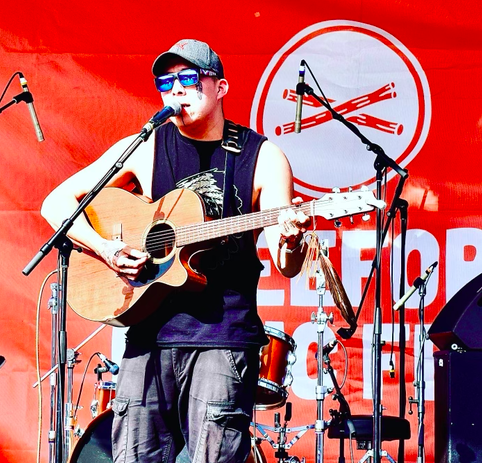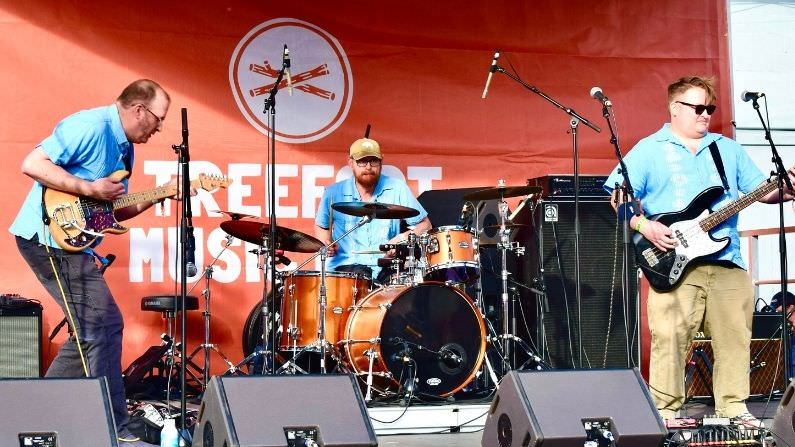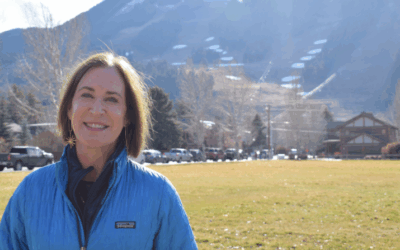Jackson folk musician Missy Jo was all smiles last month after her set at Treefort Music Festival’s Wyoming Showcase, held in an open lot in Boise’s downtown between a local brewery and a pub. Jo was not only happy to escape Teton County’s mud season weather, she was also excited to support other Cowboy State musicians.
“De Gringos [y] Gremmies is on right now, and they’re playing surf rock. Like, who in Wyoming would you think would be a surf rock band? The range that exists is so awesome,” Jo said. “I think people think Wyoming is country music, but it’s this interesting mix of everything.”
That unique mix is exactly what longtime Boise resident Eric Gilbert had in mind when he founded Treefort back in 2012. Gilbert now serves as festival director and talent booker, but he originally got inspired through his own experience as an artist.

Northern Arapaho artist Christian Wallowing Bull opened the Wyoming Showcase. (Will Walkey/KHOL)
“When I was 26, 27, my wife and I started a band. She’s very talented. I’m moderately talented. And with a friend just start touring the country in a van, pretty DIY style, and just wanted to create the life experience that we wanted,” he said. “It was pretty organic, but there was some intention like, ‘Okay, well, can we build the kind of scene in Boise that would make it feel good to live here?’”
When the festival started, about 100 bands played at Treefort. This year, there were more than 500. Gilbert said, somehow, audience members are convinced to come watch acts they’ve never heard of before. If you’re looking for Taylor Swift, you’re in the wrong place.
“It’s curated from the lens of artists and music nerds, you know, like college and community radio stations,” Gilbert said. “Just because it’s not popular doesn’t mean it’s not good, and one of the things I’m most proud of from Treefort is we have, for at least five days a year, we’ve convinced a very much broader public to show up for a bunch of weird music.”
And there are not just tunes at more than 60 venues spread out around the city. The festival has also grown to include different so-called “forts” for food, storytelling, technology and even yoga. Gilbert said that all happened over time through local partnerships.
“I think some people think that was all part of the big plan. No, it was just like, we just listened to another,” he said. “People from different niches in the community came like, ‘Hey, can we start a film fort?’ Like, ‘Yeah. Will you do it?’”

Local art, film and other cultural programs were on full display at Treefort 2022. (Will Walkey/KHOL)
The end product is an expanding event mirroring the explosion of Boise as a metro area. The festival was covered this year by national press and half the attendees were from outside Idaho. What’s more, talent agents traveled in from all over looking for the next big act. The question is: How does Treefort keep this momentum going?
That was the subject of a panel discussion the day after the Wyoming Showcase. 32 million people attend at least one U.S. music festival a year, according to Nielsen Music. There’s a big opportunity for smaller markets beyond Coachella or Lollapalooza to get their own slice of the pie. Reese Tanimura lives in Seattle and works at a folk festival there.
“Festivals, whether folks will acknowledge it or not—funders and government leaders will acknowledge or not—do create social impact,” Tanimura said.
And event organizers are looking for more ways to create social change. Treefort is building a permanent venue for the first time this year, which will serve as their main stage for the next festival. Other events are trying to pay their staff more and even provide retirement funds for visiting artists.
“I would love to build out sort of a safety net system, you know, like between festivals. Where if they’re playing throughout the year, they’re in the system,” Tanimura said.
For Gilbert, creating more opportunities and bigger venues is great. But he doesn’t want Treefort to lose that “it” factor that made the homegrown event initially successful. However, he thinks some change is inevitable.
“I empathize with some of these bigger festivals like South by Southwest or something,” he said. “At some point, it certainly is, I guess, that they lose control or some of the culture around it, right? And so, that’s something we put a lot of thought into.”
Something else he’s put a lot of thought into is allowing space for diversity—artistically and racially, but also geographically. Taylor Craig is from the Wyoming Arts Council. She was offered six spots this year to showcase Cowboy State talent. 25 bands applied.
“It helps build the audiences of Wyoming musicians beyond, you know, their town,” Craig said. “To promote them so they can continue to make a living, being a musician and hopefully stay in Wyoming creating that music.”
Craig also said she was able to work well with Treefort because they trusted her expertise to find the right applicants from her home state, like Missy Jo.
“We need more, as we spent some isolated time in these past couple of years, more opportunities for us to come together,” Jo said. “And more than just ‘Let’s go to the bar and see a band.’ But oh, ‘Look at this art installation, look at this play.’ It’s what’s keeping us human.”
Treefort kicks off spring and summer tours for many local artists. But for the organizers who put together two festivals in seven months due to pandemic disruptions, now comes some well-deserved R&R.
KHOL Music and Community Affairs Director Jack Catlin provided production, interview and moral support in Boise for this story. More coverage from Treefort, including individual band interviews, will be available on KHOL’s website in the coming weeks.






